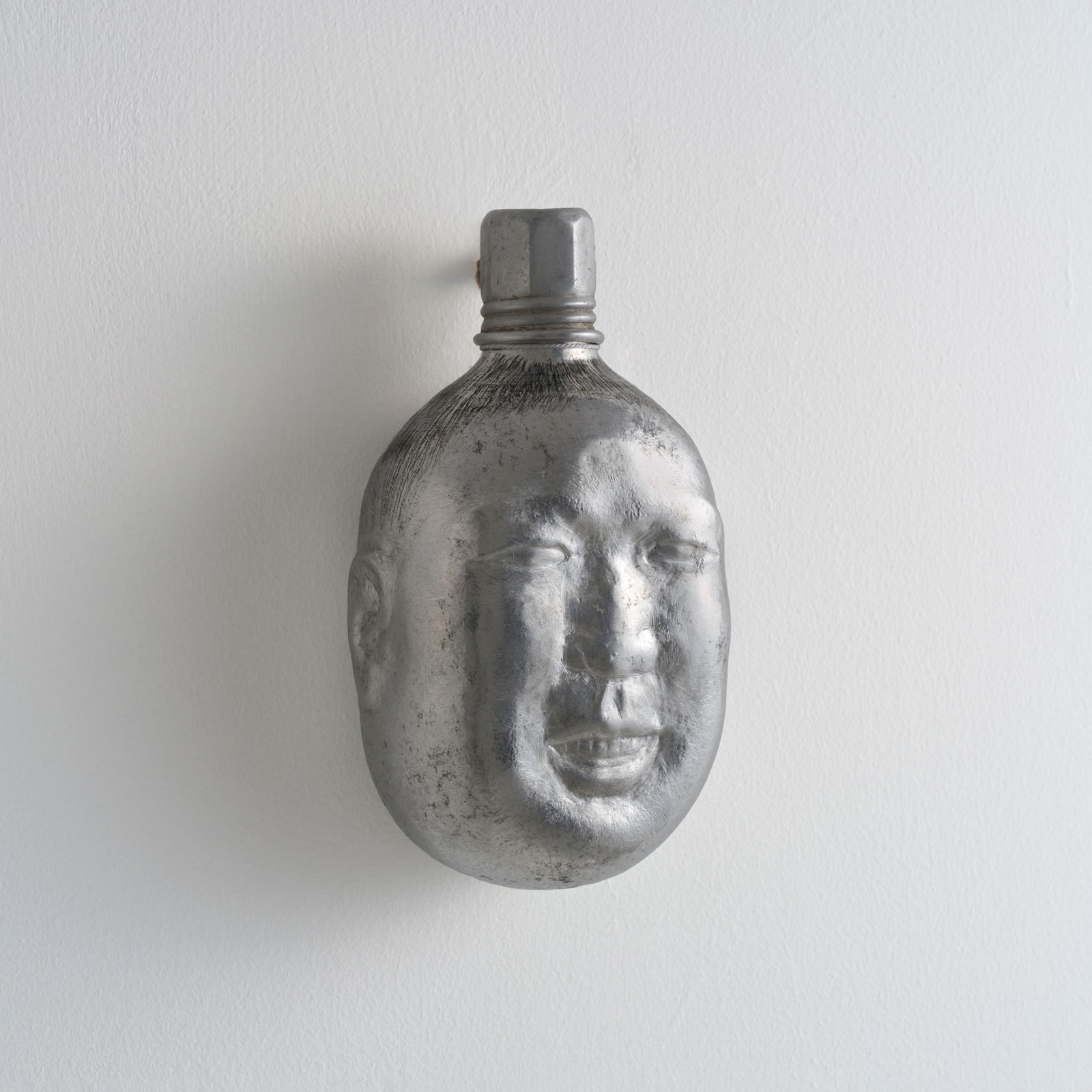Tian Jianxin 田建新
Sideburn 鬓, 2024
Japanese aluminium bottle日本铝水壶
11 x 6 x 18 cm
4 1/2 x 2 1/2 x 7 in
4 1/2 x 2 1/2 x 7 in
Further images
Tian Jianxin’s 'Sideburn' (2024) is a playful work that reimagines a found object — a Japanese aluminum bottle — through manual alteration. The bottle, typically utilitarian, serves as the canvas...
Tian Jianxin’s "Sideburn" (2024) is a playful work that reimagines a found object — a Japanese aluminum bottle — through manual alteration. The bottle, typically utilitarian, serves as the canvas for a surreal transformation. At its center, a smiley face emerges from the surface, as though it is coming to life, imparting a sense of both humor and intrigue.
Using hammering and chiseling, Tian alters the smooth aluminum surface. The marks left by the hammer and chisel provide a raw, almost visceral quality to the piece, contrasting with the innocent, iconic nature of the smiley face. This juxtaposition creates a tension between the simplicity of the image and the complex, labor-intensive process behind its creation.
"Sideburn" evokes a sense of whimsy while also raising questions about identity, consumerism, and the re-contextualization of everyday objects. By transforming a seemingly mundane object into a vehicle for expression, Tian Jianxin invites viewers to reflect on the ways in which we assign meaning to the objects around us, and how these objects can take on new significance when altered by an artist’s hand.
Tian Jianxin was born in Baoding, Hebei Province, China in 1994, and currently lives and works in Beijing. He received his bachelor’s and master’s degrees in sculpture from the Central Academy of Fine Arts in 2018 and 2022. Having been trained in classical sculpture, Tian blends the profound simplicity of Buddhist statuary, the wit of folkloric figure-making and the naturalistic objectivity of classical Western sculpture to create full-bodied forms, while making a humorous twist through his reconstruction of found everyday objects, ranging from kitchen utensils to architectural ornaments. Glimpses of the artist’s lived experience emerge from the history and traits of the altered objects, composing a myth of mundanity.
田建新(Tian Jianxin)的《鬓角》(2024)是一件富有趣味与创意的作品。通过手工改造了一个被发现的物品——一个日本铝制瓶,田建新将这件本应充当实用物品的瓶子转化为一幅超现实的画布。瓶身中央浮现出一个微笑的面孔,仿佛正在幻化成真,为作品注入了一种幽默与神秘的意象。
田建新以锤击与凿刻的方式,改变了铝制瓶的光滑表面,留下了粗犷而原始的痕迹,使作品展现出一种几乎可以触摸的质感。这种质感与面孔的天真与标志性形成了鲜明的对比,同时也在简单的图像和复杂的人为劳动创作之间创造了一种独特的张力。
《鬓角》不仅唤起了轻松俏皮的感觉,更引发了关于身份、消费主义以及日常物品如何被重新赋予意义的思考。通过将一件平凡的物品转化为创作的媒介,田建新邀请观众思考我们如何赋予身边的物品以意义,以及当这些物品被艺术家之手改变后,是如何获得新的象征与内涵。
田建新 1994 年生于中国河北保定,现工作生活于北京。他在 2018 年和 2022 年分别获得中央美术 学院雕塑系的学士和硕士学位。在其接受的传统造型训练的影响下,他的雕塑有些或肌肉浑圆,或 骨相饱满,将佛教雕像的博约、民间塑像的趣味以及西方古典雕塑的客观与写实融冶为一体。另一 些则在中正平和之外,多了一丝诙谐幽默。他通过重塑日常生活中收集和拾得的厨具和建筑装饰物 等现成品来表达造型和感受,在物品自身的历史和特质中注入他亲历的生活瞬间,叙述一个凡俗日常的诗意神话。
Using hammering and chiseling, Tian alters the smooth aluminum surface. The marks left by the hammer and chisel provide a raw, almost visceral quality to the piece, contrasting with the innocent, iconic nature of the smiley face. This juxtaposition creates a tension between the simplicity of the image and the complex, labor-intensive process behind its creation.
"Sideburn" evokes a sense of whimsy while also raising questions about identity, consumerism, and the re-contextualization of everyday objects. By transforming a seemingly mundane object into a vehicle for expression, Tian Jianxin invites viewers to reflect on the ways in which we assign meaning to the objects around us, and how these objects can take on new significance when altered by an artist’s hand.
Tian Jianxin was born in Baoding, Hebei Province, China in 1994, and currently lives and works in Beijing. He received his bachelor’s and master’s degrees in sculpture from the Central Academy of Fine Arts in 2018 and 2022. Having been trained in classical sculpture, Tian blends the profound simplicity of Buddhist statuary, the wit of folkloric figure-making and the naturalistic objectivity of classical Western sculpture to create full-bodied forms, while making a humorous twist through his reconstruction of found everyday objects, ranging from kitchen utensils to architectural ornaments. Glimpses of the artist’s lived experience emerge from the history and traits of the altered objects, composing a myth of mundanity.
田建新(Tian Jianxin)的《鬓角》(2024)是一件富有趣味与创意的作品。通过手工改造了一个被发现的物品——一个日本铝制瓶,田建新将这件本应充当实用物品的瓶子转化为一幅超现实的画布。瓶身中央浮现出一个微笑的面孔,仿佛正在幻化成真,为作品注入了一种幽默与神秘的意象。
田建新以锤击与凿刻的方式,改变了铝制瓶的光滑表面,留下了粗犷而原始的痕迹,使作品展现出一种几乎可以触摸的质感。这种质感与面孔的天真与标志性形成了鲜明的对比,同时也在简单的图像和复杂的人为劳动创作之间创造了一种独特的张力。
《鬓角》不仅唤起了轻松俏皮的感觉,更引发了关于身份、消费主义以及日常物品如何被重新赋予意义的思考。通过将一件平凡的物品转化为创作的媒介,田建新邀请观众思考我们如何赋予身边的物品以意义,以及当这些物品被艺术家之手改变后,是如何获得新的象征与内涵。
田建新 1994 年生于中国河北保定,现工作生活于北京。他在 2018 年和 2022 年分别获得中央美术 学院雕塑系的学士和硕士学位。在其接受的传统造型训练的影响下,他的雕塑有些或肌肉浑圆,或 骨相饱满,将佛教雕像的博约、民间塑像的趣味以及西方古典雕塑的客观与写实融冶为一体。另一 些则在中正平和之外,多了一丝诙谐幽默。他通过重塑日常生活中收集和拾得的厨具和建筑装饰物 等现成品来表达造型和感受,在物品自身的历史和特质中注入他亲历的生活瞬间,叙述一个凡俗日常的诗意神话。







